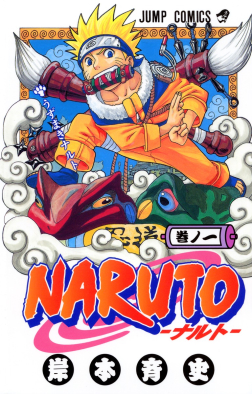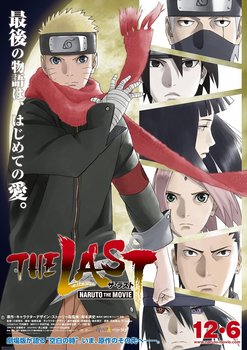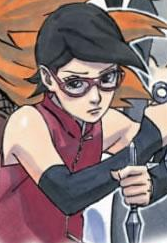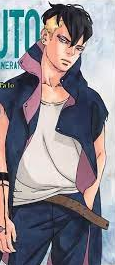
Naruto is a Japanese manga series written and illustrated by Masashi Kishimoto. It tells the story of Naruto Uzumaki, a young ninja who seeks recognition from his peers and dreams of becoming the Hokage, the leader of his village. The story is told in two parts: the first is set in Naruto's pre-teen years, and the second in his teens. The series is based on two one-shot manga by Kishimoto: Karakuri (1995), which earned Kishimoto an honorable mention in Shueisha's monthly Hop Step Award the following year, and Naruto (1997).

Naruto Uzumaki is the titular protagonist of the manga Naruto, created by Masashi Kishimoto. He is a ninja from the fictional Hidden Leaf Village. As a boy, Naruto is ridiculed and ostracized on account of the Nine-Tailed Demon Fox—a malevolent creature that attacked Konohagakure—that was sealed away in his body. Despite this, he aspires to become his village's leader, the Hokage, in order to receive their approval. His carefree, optimistic, and boisterous personality enables him to befriend other Konohagakure ninja, as well as ninja from other villages. Naruto appears in the series' films and in other media related to the franchise, including video games and original video animations (OVA), as well as the sequel Boruto: Naruto Next Generations, where he is the Hokage, and his son, Boruto Uzumaki, is the protagonist.

Sakura Haruno is a fictional character in the Naruto manga and anime series created by Masashi Kishimoto. Sakura is depicted as a kunoichi affiliated with Konohagakure and a part of Team 7, which consists of herself, Naruto Uzumaki, Sasuke Uchiha, and their sensei Kakashi Hatake. Besides the main series, Sakura has appeared in several pieces of the Naruto media, most notably the spin-off Naruto: The Seventh Hokage and the Scarlet Spring (2015) and the sequel Boruto: Naruto Next Generations (2016) where she married Sasuke Uchiha taking name of Sakura Uchiha and is the mother of their daughter, Sarada Uchiha.

Sasuke Uchiha is a fictional character in the Naruto manga and anime franchise created by Masashi Kishimoto. Sasuke belongs to the Uchiha clan, a notorious ninja family, and one of the most powerful, allied with Konohagakure. Most of its members were massacred by Sasuke's older brother, Itachi Uchiha, before the series began, leaving Sasuke one of the few living. Despite becoming empathetic toward his teammates Naruto Uzumaki and Sakura Haruno, Sasuke's feelings of powerlessness force him to abandon his friends and his home in his quest to become stronger, and to find Orochimaru. Sasuke appears in several of the series' animated feature films and related media, including video games, original video animations (OVAs), and Boruto: Naruto the Movie (2015) and its manga sequel, Boruto: Naruto Next Generations (2016), in which he is depicted as a vigilante supporting his village and a mentor to Naruto's son Boruto Uzumaki.
Masashi Kishimoto is a Japanese manga artist. His manga series, Naruto, which was in serialization from 1999 to 2014, has sold over 250 million copies worldwide in 46 countries as of May 2019. The series has been adapted into two anime and multiple films, video games, and related media. Besides the Naruto manga, Kishimoto also personally supervised the two canonical anime films, The Last: Naruto the Movie and Boruto: Naruto the Movie, and has written several one-shot stories. In 2019, Kishimoto wrote Samurai 8: The Tale of Hachimaru which ended in March 2020. From May 2016 through October 2020 he supervised the Boruto: Naruto Next Generations manga written by Ukyō Kodachi and illustrated by Mikio Ikemoto. In November 2020 it was announced that he had taken over as writer on the series, replacing Kodachi.

Hinata Hyuga is a fictional character in the anime and manga Naruto, created by Masashi Kishimoto. Hinata is a kunoichi and the former heiress of the Hyūga clan from the fictional village of Konohagakure. She is also a member of Team 8, which consists of herself, Kiba Inuzuka with his ninja dog — Akamaru, Shino Aburame, and team leader Kurenai Yuhi. At the start of the series, Hinata has strong admiration toward the main protagonist — Naruto Uzumaki, which eventually turns into love as the story progresses. Hinata has appeared several times in the series' feature films, most notably The Last: Naruto the Movie (2014), which revolves around her relationship with Naruto. She has also been present in other media related to the franchise, including video games, original video animations, and the manga and anime sequel Boruto: Naruto Next Generations (2016), in which she has become the mother of two kids and is now named Hinata Uzumaki.

Orochimaru (大蛇丸) is a fictional character from Naruto, a manga series created by Masashi Kishimoto. Orochimaru is a former ninja from the village of Konohagakure who is well known for work in wars which earned him the title of Sannin and becomes a terrorist as a means to cheat death, and built his own ninja village Otogakure. He succeeds to some extent in obtaining immortality by transferring between different host bodies, which became one of his driving motivations throughout the series as he targets Sasuke Uchiha for his genetic heritage. By the events of Boruto: Naruto Next Generations, he has seemingly redeemed himself and has sent his experiment Mitsuki to Konoha to become a ninja. Orochimaru has appeared in media outside the Naruto anime and manga, including several video games.

Kakashi Hatake is a fictional character and one of the main protagonists in the Naruto manga and anime series created by Masashi Kishimoto. In the story, Kakashi is the teacher of Team 7, consisting of the series' primary characters, Naruto Uzumaki, Sasuke Uchiha, and Sakura Haruno. Kakashi's past has been extensively explored in the series, resulting in a gaiden being devoted to his past experiences. Kakashi has appeared in several pieces of Naruto media, the featured films in the series, the original video animations, and the video games.

The Last: Naruto the Movie is a 2014 Japanese animated action-romance film produced by Studio Pierrot and directed by Tsuneo Kobayashi. It is the tenth film based on Masashi Kishimoto's manga and anime Naruto, and the first to be canon. It stars Junko Takeuchi, Nana Mizuki, Chie Nakamura, Showtaro Morikubo, Satoshi Hino, Kazuhiko Inoue and Noriaki Sugiyama. Set before the finale of Naruto, the film focuses on Naruto Uzumaki's ninja team as they go on a mission to stop the moon from falling, and rescue Hanabi Hyuga — Hinata Hyuga's sister — from Toneri Otsutsuki, a man who wishes to marry Hinata and punish mankind for weaponising chakra.

Naruto Shippuden: Ultimate Ninja Storm 4, known in Japan as Naruto Shippūden: Narutimate Storm 4, is a fighting game developed by CyberConnect2 and published by Bandai Namco Entertainment for PlayStation 4, Xbox One, and Windows in February 2016. It is the sixth installment and the final main installment of the Naruto: Ultimate Ninja Storm series inspired by Masashi Kishimoto's manga Naruto, and the sequel to the 2013 game Naruto Shippuden: Ultimate Ninja Storm 3 Full Burst. It was also the first Naruto video games released for PlayStation 4 and Xbox One.

Boruto Uzumaki is a fictional character created by Masashi Kishimoto who first appears in the finale of the manga series Naruto as the son of the protagonist Naruto Uzumaki and Hinata Uzumaki. He later appears as the main protagonist in the 2015 anime film Boruto: Naruto the Movie where he is training as a ninja to surpass his father, the leader of the ninja village Konohagakure and also being mentored by his father's best friend and rival, Sasuke Uchiha. Boruto also serves as a protagonist in the manga and anime series Boruto: Naruto Next Generations and the sequel series Boruto: Two Blue Vortex. Both with the retelling of the Boruto film, from his early training to his growth as a ninja fighting new menaces. Boruto also appears in video games, starting with Naruto Shippuden: Ultimate Ninja Storm 4.

Sarada Uchiha is a fictional character in the Naruto manga by Masashi Kishimoto. Introduced in the last chapter of the manga, she becomes the protagonist of the spin-off Naruto: The Seventh Hokage and the Scarlet Spring (2015). A young ninja in training, Sarada is the daughter of Sasuke and Sakura Uchiha.

Boruto is a Japanese manga series written by Ukyō Kodachi and Masashi Kishimoto, and illustrated by Mikio Ikemoto. It initially began monthly serialization under the title Boruto: Naruto Next Generations, with Kodachi as writer and Kishimoto as editorial supervisor in Shueisha's shōnen manga magazine Weekly Shōnen Jump in May 2016, and was transferred to Shueisha's monthly magazine V Jump in July 2019. In November 2020, Kodachi stepped down, with Kishimoto taking over as writer. In April 2023, the series concluded the first part of the story and, following a brief hiatus, continued in August of the same year with a second part titled Boruto: Two Blue Vortex. Boruto is a spin-off and a sequel to Kishimoto's Naruto and follows the exploits of Naruto Uzumaki's son, Boruto Uzumaki, and his ninja team.

Mitsuki is a fictional character created by manga artist Masashi Kishimoto. He was first introduced in the Naruto spin-off manga Naruto: The Seventh Hokage and the Scarlet Spring (2015), being portrayed as a transfer student attending classes in Konohagakure to become a ninja. By the events of the film Boruto: Naruto the Movie (2015), Mitzuki has become a ninja on a team with protagonist Boruto Uzumaki and Sarada Uchiha, taking a lead role in Ukyō Kodachi and Mikio Ikemoto's manga sequel to Naruto, Boruto: Naruto Next Generations (2016), and its anime prequel, which shows how he became friends with Boruto while facing different enemies. A one-shot by Kishimoto reveals that Mitsuki is an experiment created by the Legendary Sannin and former enemy of Naruto, Orochimaru, who allowed him to take his own path in life.

Naruto: The Seventh Hokage and the Scarlet Spring is a spin-off manga written and illustrated by Masashi Kishimoto. Its plot, set shortly after the epilogue of the Naruto series, focuses on Sarada Uchiha, a young ninja in training from a country called Hinokuni. Sarada is concerned about the identity of her absent father, Sasuke Uchiha, and whether Sakura Uchiha is her birth mother. Sarada goes on a quest to confirm her origins, during which she confronts a group of people who want to kill her father.

Kawaki is a fictional character from Ukyō Kodachi and Mikio Ikemoto's manga Boruto: Naruto Next Generations. Initially appearing in the flashforward in the series' debut, Kawaki is a young man who apparently would become the nemesis of the series' lead character, Boruto Uzumaki. Kawaki is later introduced as a rebellious member from the organization Kara who wishes to escape and remove his cursed mark "Karma" from his body. In his escape he meets Boruto's ninja team, who take him to the Hidden Leaf Village. Naruto takes the teenager under his wing, seeking to protect him from enemies, and he bonds with the family as time passes, beginning to view Naruto as a father-figure and Boruto as a foster brother, like Sasuke in the past Naruto series, with similar attitude.

Momoshiki Otsutsuki is a fictional character, first introduced in Pierrot's 2015 anime film, Boruto: Naruto the Movie which acts as a sequel to Masashi Kishimoto's manga Naruto. A descendant of Otsutsuki and the series' villain Kaguya, Momoshiki appears in the film as the antagonist, searching to plant a Divine Tree in the world by absorbing the energy possessed by ninjas, the chakra, most notably one of the protagonists, Naruto Uzumaki. While in the film, Momoshiki is killed by the combined forces between Naruto and his son, Boruto, he plays a bigger role in the retelling of the movie, the manga and anime series Boruto: Naruto Next Generations; in his last moments Momoshiki places a cursed seal inside Boruto so that he will gradually revive through the child's body.

Naruto is a Japanese anime television series based on Masashi Kishimoto's manga series of the same name. The story follows Naruto Uzumaki, a young ninja who seeks recognition from his peers and dreams of becoming the Hokage, the leader of his village. Just like the manga, the anime series is divided into two separate parts: the first series retains the original manga's title and is set in Naruto's pre-teen years. The second series, a direct sequel titled Naruto: Shippuden, takes place during his teens. Both anime series were animated by Pierrot, produced by Aniplex and licensed in North America by Viz Media.






















